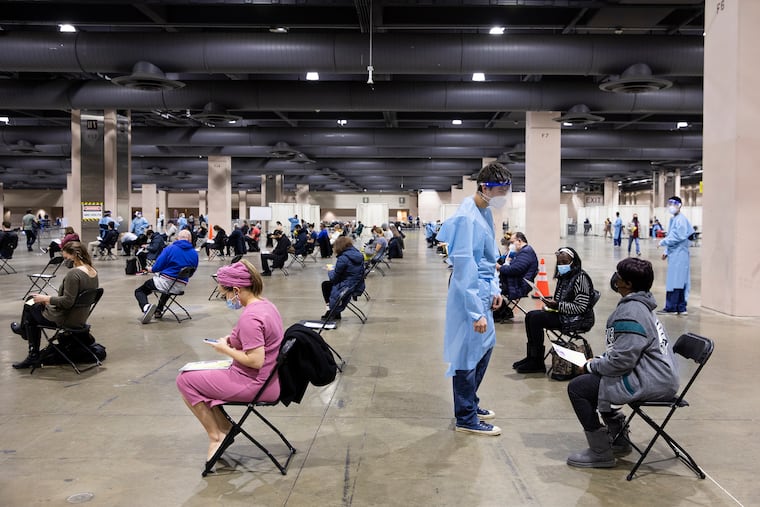COVID-19 booster shots are on the way for more of us starting Sept. 20. Here’s what you need to know.
Get ready to roll up your sleeve. Again.

Federal health officials announced Wednesday that booster shots -- already authorized for immunocompromised people -- will be available beginning the week of Sept. 20 for everyone who is at least eight months out from full vaccination.
The latest guidance comes in response to evidence that immunity wanes over time, plus the fact that the pandemic is again surging due to the highly transmissible delta variant.
The announcement is in sharp contrast to official messages in recent months that it is too soon to know whether most Americans need booster shots.
Many questions about booster shots remain to be answered, in some cases because the scientific data are lacking or unclear. Here is what we know — and don’t know.
» READ MORE: U.S. has a plan for coronavirus booster shots. Pa. and Philly say they’re ready
Do I need a COVID vaccine booster shot?
It depends.
There are ample data showing that many people who are immunocompromised because of organ transplantation, cancer treatment, or other immune-weakening conditions make few or no coronavirus-fighting antibodies after vaccination. There are also data — from a rigorously controlled trial and five studies that followed groups of patients — suggesting a third vaccine shot will stimulate an antibody response in about a third to a half of patients who don’t respond initially.
But the basis for recommending shots for healthy vaccinated Americans is less clear. Data from U.S. hot spots such as Florida and from other countries, particularly Israel, have led Biden administration officials to try to figure out why cases are again exploding. Is the delta variant evading the vaccines, or is the protection waning — or both?
In any case, Pfizer on Monday announced it has submitted data to the FDA from a study of healthy individuals 12 and up who received a third dose eight to nine months after the second dose. The booster elicited significantly higher antibody levels against the original pandemic virus, as well as the more transmissible delta and beta variants.
In their joint statement Wednesday, federal health officials including CDC director Rochelle Walensky, acting FDA commissioner Janet Woodcock, Surgeon General Vivek Murthy and Anthony Fauci said: “The available data make very clear that protection against SARS-CoV-2 infection begins to decrease over time following the initial doses of vaccination, and in association with the dominance of the Delta variant, we are starting to see evidence of reduced protection against mild and moderate disease. Based on our latest assessment, the current protection against severe disease, hospitalization, and death could diminish in the months ahead, especially among those who are at higher risk or were vaccinated during the earlier phases of the vaccination rollout. For that reason, we conclude that a booster shot will be needed to maximize vaccine-induced protection and prolong its durability.”
The FDA must authorize booster shots before the current regimen is revised.
» READ MORE: How to get a replacement vaccine card in Pennsylvania
Will I need a booster shot if I got the one-dose Johnson & Johnson vaccine?
Wednesday’s statement said that “booster shots will likely be needed for people who received the Johnson & Johnson (J&J) vaccine. Administration of the J&J vaccine did not begin in the U.S. until March 2021, and we expect more data on J&J in the next few weeks.”
The company is expected to submit data from a two-dose clinical trial later this month. That could pave the way for authorization of a J&J booster.
When will third doses be offered to all vaccinated people?
Starting the week of Sept. 20, for people who are eight months past full vaccination.
Will some groups get priority for a booster vaccine?
If you are immunocompromised, you can get a third shot now.
Wednesday’s announcement makes it clear that the first people to get vaccinated will be the first to get boosters:
“Individuals who were fully vaccinated earliest in the vaccination rollout, including many health care providers, nursing home residents, and other seniors, will likely be eligible for a booster. We would also begin efforts to deliver booster shots directly to residents of long-term care facilities at that time, given the distribution of vaccines to this population early in the vaccine rollout and the continued increased risk that COVID-19 poses to them.”
Can I get a different vaccine brand for the booster shot?
Officials envision that people will stick with the brand they originally received.
How strong will the booster protection be, and how long will it last?
This is the burning question that scientists still cannot answer. The delta variant can reinfect people who have recovered from COVID-19. Delta can also infect vaccinated individuals, although these “breakthrough” infections are generally mild and usually don’t lead to hospitalizations.
But even before the delta variant set back U.S. progress in curbing the pandemic (remember the weeks in March and April when cases and deaths plummeted as vaccination rates rose?), researchers were struggling to determine what level of antibody response is protective. The ever-mutating coronavirus has defied efforts to define this so-called correlate of protection. And other parts of the immune response against the virus, notably T-cells, remain little understood.
» READ MORE: Our best COVID-19 tips: Read our most useful articles